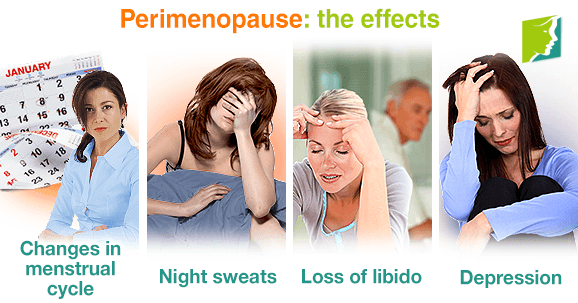Perimenopause, the years in a woman's life preceding menopause, can last anywhere from 2 - 10 years. This is the period in a women's life when she is most likely to experience many wide-ranging effects. Each woman will experience the transition to a different intensity, if she feels it at all, but it is worth remembering that healthy lifestyle choices can lessen the impact of perimenopausal symptoms. Keep reading to learn more about what to look out for.
Changes in Menstrual Cycle
Estrogen, the hormone that controls the reproductive cycle, begins to fluctuate during perimenopause, which can lead to irregular menstruation. The changes differ from woman to woman, but many report there being a shorter time between each period or bleeding becoming heavier. These changes are often nothing to worry about, but it is advised that you talk to your doctor if you notice particularly long periods, spotting or heavy vaginal bleeding.
Hot Flashes and Night Sweats
Hormonal changes during menopause cause the body to become less efficient at regulating its own temperature, which means some women fall victim to intense feelings of heat. This is usually followed by large amounts of sweat production as the body tries to cool down. Hot flashes that occur at night are termed night sweats, and these can often be the cause of interrupted sleep, which can intensify feelings of fatigue.
Vaginal Dryness
Another effect of perimenopause is physical changes to the vagina. The walls can become thinner and produce less moisture. Dryness, itchiness, and painful sex can ensue, and these factors can contribute to loss of libido, low mood, and anxiety. Although this is normally associated with hormonal changes, it could be caused by other hidden health issues.
Loss of Libido
During perimenopause, sex drive may drop because the body stops producing as much estrogen. Women are three times more likely to be affected by low sex drive than men. Fortunately, there are many natural approaches to dealing with loss of libido and hormone imbalance.
Depression
Some studies have shown that estrogen regulates the production, release, and activity of endorphins and serotonin, neurotransmitters that regulate mood. When estrogen levels are fluctuating, this can lead to low mood and feelings of depression. This depression can also be exacerbated by stressful life events, such as death of a spouse or children leaving home.
Perimenopause can have many effects on a woman's life, some more extreme than others. The effects can be caused by both internal and external factors and sometimes overlap by affecting each other. Most of the time they are nothing to worry about, but should you have any unusual or uncomfortable occurrences, it is advisable to talk to your doctor, as sometimes symptoms of other conditions could be mistaken for menopause symptoms.
Sources
- National Osteoporosis Foundation. (2014). What Women Need To Know. Retrieved July 25, 2014, from http://nof.org/articles/235
- The North American Menopause Society. (2014). Decreased Desire. Retrieved July 25, 2014, from http://nof.org/articles/235
- Zieve, D. (2011). Menopause: MedlinePlus Medical Encyclopedia. Retrieved July 25, 2014, from http://www.nlm.nih.gov/medlineplus/ency/article/000894.htm



